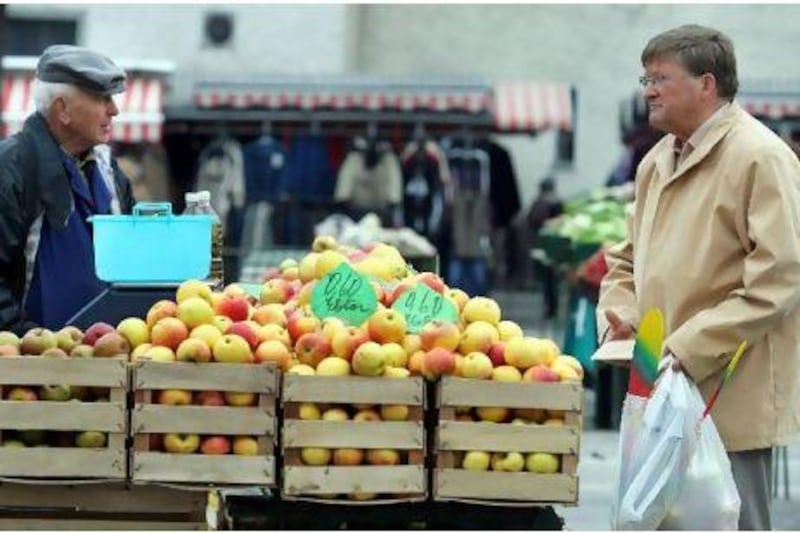It's that time of year again, the end of the Gregorian calendar. It's when executives calculate their expected bonuses.
Companies tot up their end-of-year financials and congratulate themselves on how well they have done. And people at a personal level set new year resolutions, such as buying a gym membership, which never gets used more than once or twice in that year.
The theme that ties all of these disparate elements together is growth. More specifically it is an intrinsic need for organisations and individuals to do better in the future than they did in the past. To be not only better, but bigger, shinier, faster and all those other verbs that describe growth and how exciting it is to be part of something that is moving upwards, as opposed to something standing still or declining.
Our brains and company dashboards are programmed, in fact hard-wired, to expect year-on-year growth. Anything less is simply not acceptable.
Whether it's a nation's GDP or a company's end-of-year revenue forecast, it has to be more in the future than it was in the past. Indeed, we are told by the people who "apparently" matter - analysts, financial professionals, commentators on the economy - that growth from year to year is the only way to secure the survival of life as we know it. If we don't keep growing, those behind us in the economic food chain will catch up and squash us as they muscle their way through to the front.
We should stop for a moment and ask ourselves: why should we keep expanding our economies and companies every year so that they are bigger this year than they were last year?
The typical response from defenders of the year-on-year growth model will be that if we don't continue to grow, we will see a rising number of unemployed on the streets, leading to potential social disorder and unrest; the level of tax income for governments to invest in national infrastructure, education, health projects and general upkeep will diminish; civic and public services provided by the state may be withdrawn because of austerity measures, such as the cuts taking place across much of Europe at the moment. And the list goes on. It all sounds rather scary, doesn't it?
It is a reality with which thinkers at the New Economics Foundation (NEF) have been grappling over the past year, since the NEF launched an ambitious project to create a new economic model. This new approach places a sustainable environment and equitable economic justice at its centre. It aims to address human well-being by tying it to determining factors such as income distribution, working hours and aggregate output. In effect, the NEF is trying to provide us with a blueprint to break the vicious economic cycle into which we have gotten ourselves, by placing what is important to society front and centre and doing it in light of the finite resources we are told we have left on the planet.
While the academics and thinkers at the NEF tinker away at a more sustainable and equitable macroeconomic model, others have drawn inspiration from this work and decided to take the matter into their own hands at a local level. The Transition Towns Network (TTN) is one such example that goes against the conventional wisdom of the growth model.
A fairly recent phenomenon, the TTN started in the town of Totnes, Devon, in the UK but has spread to more than 14 countries. Its objectives are "to inspire, encourage, connect, support and train communities as they self-organise around the transition model, creating initiatives that rebuild resilience and reduce CO2 emissions". So rather than waiting for central government to step in and solve local community problems, which would mean waiting far too long or leaving it to individuals who would not be able to have enough of an impact, the TTN wants people in their local communities to collectively come up with ingenious ways of creating more sustainable and equitable local economies.
By taking a positive view of sharing ideas to solve local problems, the TTN is fast becoming a platform for a host of ideas that support local growth. Take one of the recent projects, called Freedom Heating. It is being tried out in the northern Appalachians and the Catskills in New York. Freedom Heating aims to create a free heating system for indoor spaces by "utilising the energy created in carbon-nitrogen combustion reactions found inside organic breakdown". In other words, using matter such as a compost heap and burying a water hose inside it. The pioneers behind this project are testing it over this winter. Good luck to them.
Elsewhere, people have set up local food directories and delivery services so that fresh food is produced, sold and consumed locally; thereby avoiding transport costs and the use of chemicals to preserve the food over long journeys. There are clothes-swap schemes, based on the idea that most of us have in our closets new-to-newish clothes that we never wear. However, others may be able to use these, and, likewise, possessions they have wasting away in their cupboards may be just the item we are looking for.
Local and sustainable solutions such as these are what the TTN says matters to people, not what the GDP of the nation is or what is happening on the stock market indices. To create a prosperous local economy does not require targets that are geared for year-on-year growth.
Rather, the metrics, if such a term can be used in this context, are all about the need to improve the quality of people's lives, raise their living standards and make them healthier. I'd say these are resolutions worth setting for next year, wouldn't you?
Rehan Khan is a business consultant and writer based in Dubai





